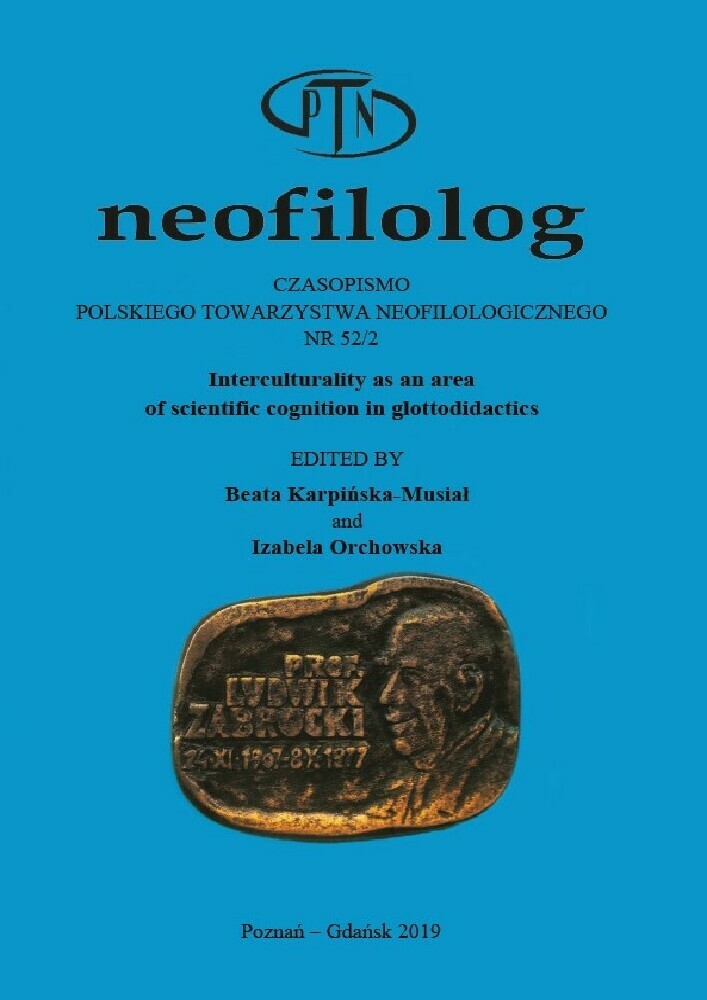Abstract
INTRODUCTIONReferences
Abdallah-Pretceille M. (1986), Vers une pédagogie intercultuelle. Paris: Publi-cations de la Sorbonne.
Bandura E. (2007), Nauczyciel jako mediator kulturowy. Kraków: Krakowskie Towarzystwo “Tertium”.
Bańczerowski J. (1975), Is Metaglottodidactics Necessary? (In) “Glottodidac-tica”, No 8, pp. 21-26.
Byram M. (1997), Teaching and Assessing Intercultural Communicative Com-petence. Clevedon: Multilingual Matters.
Council of Europe (2001), Common European Framework of Reference for Languages: Learning, teaching, assessment. Cambridge: Cambridge University Press.
Dakowska M. (2014), O rozwoju dydaktyki języków obcych jako dyscypliny naukowej. Warszawa: Wydawnictwo Uniwersytetu Warszawskiego.
Galisson R. (1989), Problématique de l’autonomie en didactique des langues (In) “Langue française”, No 82, pp. 95-115.
Grucza F. (1983), Zagadnienia metalingwistyki. Lingwistyka – jej przedmiot lin-gwistyka stosowana. Warszawa: Państwowe Wydawnictwo Naukowe.
Grucza F. (2009), Metanaukowa i metalingwistyczna wizja lingwistyki (stoso-wanej) (In) “Lingwistyka Stosowana”, No 1, pp. 19-39.
Jaroszewska A., Smuk M. (eds. 2016), “Neofilolog”, No 47/1 Interdyscyplinarne ujęcia wielojęzyczności i międzykulturowości. Poznań – Warszawa: Pol-skie Towarzystwo Neofilologiczne.
Jaroszewska A., Sujecka-Zając J. (eds. 2016), “Neofilolog”, No 47/2 Badania nad wielojęzycznością i rozwojem kompetencji międzykulturowej. Po-znań – Warszawa: Polskie Towarzystwo Neofilologiczne.
Karpińska-Musiał B. (2015), Międzykulturowość w glottodydaktyce. O związku świadomości metajęzykoznawczej z kompetencją międzykulturową w akademickim kształceniu nauczycieli języków obcych. Gdańsk: Wydaw-nictwo Uniwersytetu Gdańskiego.
Kita M. (2012), Razem: konsiliencja, interdyscyplinarność, transdyscyplinarność (In) Kita M., Ślawska M. (eds.), Transdyscyplinarność badań nad komunika-cją medialną. Katowice: Wydawnictwo Uniwersytetu Śląskiego, pp. 11-30.
Kramsch C (1996), Context and culture in language teaching. Oxford: Oxford University Press.
Macaire D., Narcy-Combes J.-P., Portine H. (eds. 2010), “Le Français dans le monde. Recherches et applications”, No 48, Interrogations épistémolo-giques en didactique des langues. Paris: CLE International.
Mackiewicz M. (ed. 2005), Dydaktyka języków obcych a kompetencja kultu-rowa i kompetencja międzykulturowa. Poznań: Wydawnictwo Wyższej Szkoły Bankowej.
Orchowska I. (2008), La formation interculturelle des futurs enseignants de FLE dans le contexte universitaire polonais. Kraków: FLAIR.
Wilczyńska W., Mackiewicz M., Krajka J. (2019), Komunikacja interkulturowa. Wprowadzenie. Poznań: Wydawnictwo Naukowe UAM.
Zając J. (2008), L’interculturel au service des compétences générales en classe de FLE (In) Lis J. & Tomaszkiewicz T. (eds.), Francophonie et intercultu-ralité. Łask: Oficyna Wydawnicza LEKSEM, pp. 159-167.
Zarate G. (1993), Représentations de l’étranger et didactique des langues. Paris: Didier.
License
Copyright (c) 2019 Neofilolog

This work is licensed under a Creative Commons Attribution-NoDerivatives 4.0 International License.
Authors
Authors of texts accepted for publication in Neofilolog are required to complete, sign and return to the Editorial team’s office the Agreement for granting a royalty-free license to works with a commitment to grant a CC sub-license.
Under the agreement, the authors of the texts published in Neofilolog grant Adam Mickiewicz University in Poznań a non-exclusive, royalty-free license and authorize the use of Attribution-NoDerivatives 4.0 International (CC BY-ND 4.0) Creative Commons sub-license.
The authors retain the right to the free disposal of the work.
Users
Interested Internet users are entitled to use works that have been published in Neofilolog since 2017, under the following conditions:
▪ attribution – obligation to provide, together with the distributed work, information about the authorship, title, source (link to the original work, DOI) and the license itself.
▪ no derivatives – the work must be preserved in its original form. Without the author's consent, it is not possible to distribute the modified work in the form of translations, publications, etc.
Copyrights are reserved for all texts published since 2017.
Miscellaneous
Adam Mickiewicz University in Poznań retains the property right as a whole (layout, graphic form, title, cover design, logo etc.).

